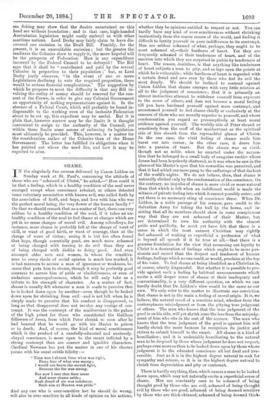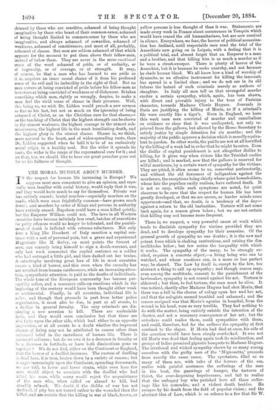SHAME.
IN the singularly fine sermon delivered by Canon Liddon on Sunday week at St. Paul's, concerning the attitude of those who are "ashamed of Christ," he asked,—" How could it
be that a feeling, which in a healthy condition of the soul never emerged except when conscience rebuked, or others detected some voluntary association with known evil, was called forth by the association of faith, and hope, and love with him who was the perfect moral being, the very flower of the human family " On that we should remark that as a matter of fact, there can very seldom be a healthy condition of the soul, if it takes an un- healthy condition of the soul to feel shame at charges which are yet in no sense charges of moral evil. Among schoolboys, for instance, more shame is probably felt at the charge of want of skill, or want of good birth, or want of courage, than at the charge of want of virtue ; seeing it is but too often found that boys, though essentially good, are much more ashamed of being charged with fearing to do evil than they are of being charged with dislike to doing good. And even amongst older men and women, in whom the sensitive- ness to every shade of social opinion is much less marked, it is bad manners to accuse a man of ignorance or weakness, be- cause that puts him to shame, though it may be perfectly good manners to accuse him of pride or vindictiveness, or even of audacious unscrupulousness, which he will only take as a tribute to his strength of character. As a matter of fact, shame is usually felt whenever a man is made to perceive that he is looked down upon by another—even though he be looked down upon for shrinking from evil—and is not felt when he is simply made to perceive that his conduct is disapproved, so long as that disapproval does not involve any vestige of con- tempt. It was the contempt of the maidservant in the palace of the high priest for those who constituted the Galilean followers of Jesus, from which Peter shrank so soon after he had boasted that he would go with his Master to prison or to death. And, of course, the kind of moral sensitiveness which is the product of a carefully-educated and anxiously- obeyed conscience, is more open to the smart inflicted by a strong contempt than are coarser and ignobler characters. Cardinal Newman has put the matter in one of his shorter poems with his usual subtle felicity :—
"Time was I shrank from what was right, From fear of what was wrong ; I would not brave the sacred fight, Because the foe was strong.
But now I east that finer sense And sorer shame aside ; Such dread of sin was indolence, Such aim at Heaven was pride."
And any one who is over-sensitive lest he should do wrong, will also be over-sensitive to all kinds of opinion on his actions,
whether they be opinions entitled to respect or not. You can hardly have any kind of over-sensitiveness without shrinking instinctively from the coarse sneers of the world, and finding it difficult to fortify yourself in your indifference to its contempt. Men are seldom ashamed of what, perhaps, they ought to be most ashamed of,—their hardness of heart. Yet they are frequently ashamed of their tenderness of heart, and of the emotion into which they are surprised in public by tenderness of heart. The reason, doubtless, is that anything like tenderness of heart subjects a man to pity, and so lays open the points at which he is vulnerable ; while hardness of heart is regarded with a certain dread and awe even by those who feel its evil the most deeply. We should be inclined to contend against Canon Liddon that shame emerges with very little relation at all to the judgment of conscience ; that it is primarily an almost instinctive attempt to withdraw yourself from exposure to the scorn of others, and does not become a moral feeling till you have hardened yourself against mere contempt, and accustomed yourself to feel shame chiefly or exclusively at the censure of those who are morally superior to yourself, and whose condemnation you regard as presumptively at least moral evidence against yourself. The worldly side of Peter shrank as sensitively from the scoff of the maidservant as the spiritual side of him shrank from the reproachful glance of Christ. In the one case, the vivid feeling of shame made him burst out into curses ; in the other case, it drove him into a passion of tears. But the shame was as vivid, though not as noble, when he smarted under the accusa- tion that he belonged to a small body of sanguine rustics whose dream had been hopelessly shattered, as it was when be saw in the glance of his Master's eyes that his cowardice was perceived, and that it had added one more pang to the sufferings of that darkest of the world's nights. We do not believe, then, that shame is naturally elicited only by the condemnation of the conscience. On the contrary, no impulse of shame is more vivid or more natural than that which is felt when an indifferent world is made the witness of private feeling into which it cannot possibly enter; and yet there is no necessary sting of conscience there. When Dr. Liddon, in a noble passage of his sermon, gave credit to the Salvation Army for taking the bull by the horns, and in- sisting that all its members should show in some conspicuous way that they are not ashamed of their Master, but are determined to own his authority with the utmost pride and publicity, he must yet have felt that there is a. sense in which the most earnest Christian may rightly feel ashamed of making so superficial a profession of what is beyond all speech if it be true at all,—that ',here is a genuine foundation for the view that screaming out loyalty to Christ is a desecration of feelings which ought to be more pas- sionate and sacred than the deepest and tenderest of human feelings, feelings which no one could, or would, proclaim at the top of his voice. To feel shame at being identified as a Christian is, of course, utterly disgraceful. But whether it is possible to pro- vide against such a feeling by habitual announcements which excite a still deeper sense of shame at their inadequacy and conventionality, is a very different question, on which we can hardly doubt that Dr. Liddon's view would be the same as our own. We only refer to the matter to illustrate our conviction that shame is not in the main a feeling of moral origin. It is, we believe, the natural recoil of a sensitive mind, whether from the contemptuous misjudgment or from the pitying true judgment of others. The man who knows that the true judgment of the good is on his side, will yet shrink none the less from the misjudg- ment of him who sits in the seat of the scorner. The man who, knows that the true judgment of the good is against him will hardly shrink the more because he recognises its justice and strives to submit himself to the smart. All shame is a kind of humiliation ; and it is undeniably humiliating to the natural man to be despised by those whose judgment he does not respect, perhaps even more so than to be looked down upon by those whose judgment is to the educated conscience all but final and irre- versible. Just as it is in the highest degree natural to seek for sympathy and esteem, so it is in the highest degree natural to shrink from depreciation and pity or contempt.
There is hardly anything,then, which causes a man to be looked down upon, which may not naturally excite a superficial sense of shame. Men are constantly seen to be ashamed of being thought good by those who are evil, ashamed of being thought evil by those who are good, ashamed of being deemed sensitive by those who are thick-skinned, ashamed of being deemed thick-
skinned by those who are sensitive, ashamed of being thought imaginative by those who boast of their common-sense, ashamed of being thought limited to common-sense by those who are imaginative, and always ashamed of cowardice, ashamed of weakness, ashamed of sensitiveness, and most of all, probably, ashamed of shame. But men are seldom ashamed of that which appears for the moment to put them above their fellow-men, instead of below them. They are never in the more emotional sense of the word ashamed of pride, or of audacity, or
of ingenuity, or of courage, or of strength. It may, of coarse, be that a man who has learned to see pride as it is, acquires an inner moral shame of it from his profound sense of its evil and its imbecility in the sight of God. But no man cowers at being convicted of pride before his fellow-men as he cowers at being convicted of weakness or of dishonour. It takes something which men, rightly or wrongly, despise, to make a man feel the vivid sense of shame in their presence. Well, this being so, we wish Dr. Liddon would preach a new sermon as fine as his last, but not so much on the ignominy of being ashamed of Christ, as on the Christian cure for that shame,— on the teaching of Christ that the highest strength can be shown in the utmost weakness, the highest courage in the utmost sub- missiveness, the highest life in the most humiliating death, and the highest glory in the utmost shame. Shame is, we think, more natural to the heart, and of wider-spreading roots, than Dr. Liddon suggested when he held it to be of an exclusively moral origin in a healthy soul. But the wider it spreads its roots, the wider is the range of the supernatural cure for it ; and on that, too, we should like to hear our great preacher pour out for us his fullness of thought.







































 Previous page
Previous page